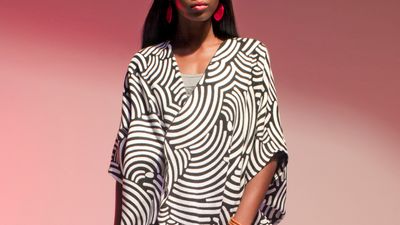Style: 10 Reasons Why It's Time to #BuyAfrican Fashion
The founder of African style website, My Asho, gives us 10 reasons to buy African fashion.
Photos courtesy of MyAsho.com.
I remember the exact moment I decided to start an online African fashion store. I was on the sofa in my student digs, gabbing on the phone with my best friend while absent-mindedly watching a TV report on a Ghanaian fashion show. As I watched, a gorgeous dress sauntered down the runway and my heart sank as I realized it'd never be mine. I'd never been to Ghana and I wasn't about to go just because of a dress. Or was I?
Fast forward eight years and I, along with my team, run two websites dedicated to African fashion: myasho.com and myashomarket.com. My Asho, our luxe site, features pieces which are very time consuming to make, and/or incorporate traditionally produced fabrics that are difficult to source as they may be hand-loomed or hand dyed. My Asho Market, on the other hand, focuses on fun and affordable pieces aligned with the latest fashion trends.
I won't lie. It has been a long and difficult journey and we have faced a lot of unpleasantness, to put it nicely. From learning first hand which suppliers could deliver, to mainstream media pigeonholing what we do, to seeing genuinely talented designers not getting the accolades and opportunities they deserve and having to step away from the industry.
It has been a rough ride, but my dogged belief is that this industry and what we collectively do is for a greater good. I applaud every like minded entrepreneur who has set upon this track. From cotton growers, to fabric manufacturers, to those making little coconut buttons, to tailors that cut and sew the pieces, to the tanners who provide the leather for our bags, to the bronzers who use ancient casting techniques to make unique pieces of jewelry, the industry goes far beyond our e-commerce sites.
This is the potential of African fashion: a thriving industry with stories behind every product. How can it even compare to the mass market cloned products that flood the shops—everyone wearing the same thing?
There is an age-old debate around what defines "African fashion" and the origin of the "African print" and through our platforms we have added our two cents to the issues. Labels are easy to create and are often necessary to make things more digestible for consumers. The danger, and what we experience in reality, is that the essence of an industry can easily get lost. Africa is a continent of 54 countries and defining the ethos, or defining a singular fashion aesthetic for that entire continent with its multitude of cultures, traditions, languages is impossible. Limiting it to trends such as “tribal chic” or “safari traveller” or even “African fashion” can actually be detrimental.
We don’t claim to have the answers or the perfect way to help grow the industry. Our view on what we do is very clear: We work with designers across Africa and the rest of the world, selecting pieces from their collections which we believe our customers will like, and we retail them online. As much as we can, we source our prints from manufacturers based in Africa such as Printex Ghana, GTP and Nichem, supporting their industries as much as we can as we are proud to use African prints which are actually made in Africa. That is what we do. And there are other similar minded folks like us—other fashion e-commerce sites, small fashion boutiques and stockists and fabric retailers and distributors. It all comes down to how you show your support.
Social media likes, nods and retweets are very nice, but they don't pay a tailor's wages. If you consciously commit to spending 10 percent of your monthly fashion budget on African designers, you will help this industry to really gain some traction. So, let's come together and start a fashion revolution.
Here are my 10 key reasons to #BuyAfrican.
1. You get unique, one-of-a-kind products. It simply doesn't compare to high street products. The nature of fabric availability means products can only be produced in limited quantities.
2. Supporting local African industries and creating employment—be it small tailoring workshops, fabric printers, fabric dyers, weavers and so on. The multiplier effect on education, financial independence and even health is unbelievable.
3. Encouraging African design talent. We have so many enquiries from designers wanting to design and stock products. If the global demand is there, we would be able to add many new designers and give them opportunities to showcase their talent.
4. Keep people like me optimistic that we're doing something right and not wasting our time.
5. Sticking a middle-finger up to the naysayers. Show them that we can support each other and grow an industry without it becoming some charitable cause or global pity party.
6. Owning it: creating our own narrative. Stella Jean, a very talented Italian designer with Haitian roots, is known in mainstream fashion as the go to African brand. What she does is great HOWEVER her use of African prints does not make her brand African. Where are the homegrown African designer brands? Let us support and nurture them!
7. Avoiding stereotypes. Can we build up an industry based on our aesthetics through market demand and supply? Or do we need to wait for a multinational corporation to swoop in and do it their way? Because more and more international companies are looking into Africa and their intentions are not always pure.
8. Competing on a global level. Through product quality assurance, excellent customer service and reasonable price points, products that are delivered are on par with global standards.
9. Because it's cool. Enough said.
10. And because in all seriousness, your support for the #buyAfrican movement can make or break the industry. Make a difference.
